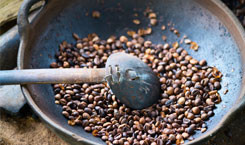Fresh coffee for breakfast?
Today quite normal. But that wasn't always the case.
For centuries, coffee was a luxury product that only wealthy people could afford. Not so long ago, very thin coffee, sometimes even thickened into a coffee soup, was the only affordable way for most people to enjoy the black gold, bubbling over the fire all day long.
Coffee came to Europe in the 17th century, and Venice, in particular, was the gateway through which the aromatic beans quickly conquered the entire continent. Coffee was very expensive for a long time, especially because it was still cultivated today and transported overseas for a long time, coffee beans became an expensive status symbol and luxury drink. In the coffee houses of Europe, bourgeois people, businessmen, and the nobility met. The increasing consumption of coffee, which in the 18th century also began to reach the lower social strata, became a problem for the German beer breweries. Beer, which at that time was the most common drink instead of water, was increasingly replaced by coffee and its obvious advantages. The stimulating coffee soup replaced the traditional beer soup. The beer soup was nutritious, but also tired.
Coffee soup, also called coffee pulp or mash, consisted of quite thin coffee or coffee substitute, milk, pieces of bread, grain and sometimes many other ingredients. The whole day long-simmering the coffee soup was drunk above all in the morning. At that time coffee roasts contained far more caffeine. When Frederick the Great could not solve the coffee problem of the German breweries with taxes, he decided to impose a coffee ban throughout Prussia, which he even enforced with special "coffee sniffers". They roamed the streets and smelled where beans were roasted or brewed. The punishment followed.
The price for smuggled, genuine coffee rose rapidly and forced many coffee lovers to switch to substitute products such as grain coffee or ration. Today, coffee has become much cheaper, mainly due to technical progress in production and transport.
Today we can enjoy fresh, good and even "legal" coffee almost every day.

